|
|
|
Sort Order |
|
|
|
Items / Page
|
|
|
|
|
|
|
| Srl | Item |
| 1 |
ID:
108115
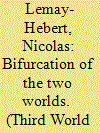

|
|
|
|
|
| Publication |
2011.
|
| Summary/Abstract |
Studies increasingly highlight the limits of state building conducted 'from the top-down'. Building on the literature and using a Rosenauian concept in a novel way, this article posits that international interventions create a 'bifurcation of the two worlds'. Departing from a study of Kosovo and Timor-Leste, the article posits that the massive arrival of staff involved in international governance will create a social gap between the international and the local 'worlds', which will in turn become a target of narratives of resistance by local actors. This bifurcation is exemplified by the 'white car syndrome', a concept representing the horde of white UN vehicles accompanying major interventions and developed in this contribution. Thus, the article attempts to shed new light on the legitimacy crises that Kosovo and Timor-Leste experienced at the beginning of the current century, while demonstrating and increasing the linkages between development studies and peace studies.
|
|
|
|
|
|
|
|
|
|
|
|
|
|
|
|
| 2 |
ID:
139224
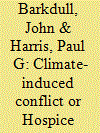

|
|
|
|
|
| Summary/Abstract |
What are the implications of global climate change for peace and human welfare in the future? The answer depends on the actual effects of climate change and how the world responds to them. Current economic and political systems are unlikely to produce the policy and institutional changes needed to reduce adequately the greenhouse gas (GHG) emissions causing the problem, so some of the most dangerous effects of climate change could occur this century. Some observers posit that climate change will result in catastrophe, but specifics of this catastrophe range widely. Does climate change mean painful but manageable social disruption, requiring, for instance, populations to move and cities to be rebuilt? Or does climate change portend much worse, including major wars, the end of modern civilization or, incredibly, even the eventual extinction of humanity? If these more severe consequences are likely or possible, what kind of global society would be best able to survive, or at least cope? The answer may be found in eco-socialism and a ‘Hospice Earth’ that nurtures people and societies regardless of how bad the future becomes.
|
|
|
|
|
|
|
|
|
|
|
|
|
|
|
|
| 3 |
ID:
143659
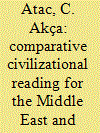

|
|
|
|
|
| Summary/Abstract |
The 1990s witnessed a bloom of studies on the ‘standard of civilization', which all aimed to explore the future of the rift between the East and the West. The Arab Spring and its implications for the primordial competition between the East and the West has once again required the revisiting of certain, rather more contemporary, theoretical aspects of the grand debate on civilization. This paper aims to introduce current arguments pertaining to the grand debate on civilization into the context of the Arab Spring. In doing so, it seeks to offer a comparative perspective of the quest for understanding the current situation in the Middle East with particular reference to the civilization discourse which is currently on the rise in Turkish politics. Turkey is among the actors in the Middle East seeking to assume leadership in order to establish peace in the region.
|
|
|
|
|
|
|
|
|
|
|
|
|
|
|
|
| 4 |
ID:
113749
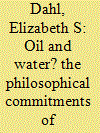

|
|
|
|
|
| Publication |
2012.
|
| Summary/Abstract |
While there have been important studies that have mapped the fields of peace studies (PS) and conflict resolution (CR), the focus usually has been on tracing their historical evolution and typical areas of application. In contrast, this article aims to examine PS and CR's philosophical assumptions and commitments, topics more rarely investigated. Rather than assuming that CR and PS are analyzing, diagnosing, and addressing conflict in the same way, this study will trace their respective philosophical genealogies (including, where possible, variations within each) and the concrete implications of these stances in terms of intellectual wagers about power, truth, structure, and conflict. These findings will tell us more about what is happening in these two fields and guide future study.
|
|
|
|
|
|
|
|
|
|
|
|
|
|
|
|
| 5 |
ID:
174607
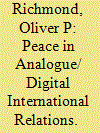

|
|
|
|
|
| Summary/Abstract |
This article outlines a preliminary perspective of peace in IR resting on analogue and digital versions in mainstream and critical forms. It discusses their implications for long standing key debates in the discipline about war and peace. It argues that digital IR/ international relations were initially thought to be a breakthrough for global civil society and rights, which promised a more emancipatory form of peace by allowing individuals and civil society to challenge power structures more effectively, and by curtailing the bounding effects of territorialism, sovereignty and nationalism. This gave critical forms of agency space to network. However, a brewing ‘counter-revolution’ of what might be now called the ‘ancien regime’ once again, points to digital forms of governmentality, which replicates the liberal and neoliberal governmentalities of the last few decades. This may make the analogue ‘liberal peace’ look like a virtuous high-water mark in recent history. Furthermore, a digital version of peace has yet to be developed.
|
|
|
|
|
|
|
|
|
|
|
|
|
|
|
|
| 6 |
ID:
126045
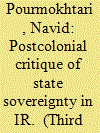

|
|
|
|
|
| Publication |
2013.
|
| Summary/Abstract |
This paper presents a postcolonial critique of state sovereignty as it is understood in ir. It is argued that the colonial relation between Orient and Occident has informed the development and practice of sovereignty. The Orient has been on the losing end of this relationship, as its experiences, trajectories and sociocultural and political life have been reduced to a set of homogeneous deficiencies. The result has been to consign it to a zone of 'Otherness', wherein sovereignty has become synonymous with inferiority and difference vis-à-vis the Occident. In demonstrating that ir has been dominated by a Western intellectual tradition that privileges the concept of sovereignty, I will critically question the epistemological privileging of the West, and in particular of Europe, as a source of knowledge regarding state sovereignty and interrogate how the East-West dichotomies-eg civilised-uncivilised, modern-traditional, democratic-undemocratic-that underpin ir studies make the practice of sovereignty a 'conditional' virtue for non-Western states, in both theory and practice.
|
|
|
|
|
|
|
|
|
|
|
|
|
|
|
|
| 7 |
ID:
169173
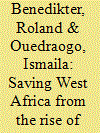

|
|
|
|
|
| Summary/Abstract |
Terrorism is on the rise in the Sahel zone. It is the effect of a multitude of factors partly stemming from global influences and partly home-made. Burkina Faso is a contemporary case of how efforts to pacify a developing region through an emergency program are undertaken both by African nations and the international community, focusing mainly on economic and military dimensions; and how a more multidimensional and transdisciplinary strategy is needed to succeed in stabilizing conflict areas such the Sahel under the sign of transition and change.
|
|
|
|
|
|
|
|
|
|
|
|
|
|
|
|
| 8 |
ID:
172156
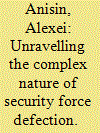

|
|
|
|
|
| Summary/Abstract |
This study analyses a large number of regime-change seeking movements, their experiences with state repression, and the outcome of security force defection. Crisp-set Qualitative-Comparative Analysis (csQCA) is utilised to investigate six conditions and set-theoretic associations with defection. Results reveal that defection is neither sufficiently nor necessarily tied to any single condition. Contrary to theoretical expectations, of the most salient identified solutions, three out of five feature the presence of a violent oppositional campaign. There exist heterogeneous pathways that can lead to defection and defection has occurred in cases of both violent and nonviolent resistance. While mass nonviolent dissent can spur defection by fostering regime fragility, by providing protesters favourable opportunities to overcome state repression or through persuading security forces to not repress, large violent movements (100,000 or more participants) can also cause defections by directly challenging regime security support pillars. This analysis offers timely implications for our understanding of the interrelated character of dissent, repression and security force defection.
|
|
|
|
|
|
|
|
|
|
|
|
|
|
|
|
|
|
|
|
|